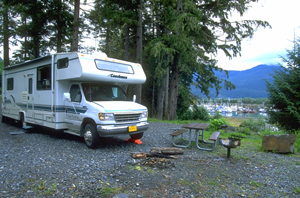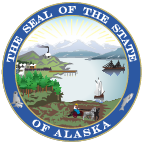The following is a greeting given in one of the 20 indigenous languages recognized by the State of Alaska.
- Ade’ ndadz dengit’a?
- Language: Deg Xinag
- Translation: "Hello, how are you?"
Customs Information
Customs Information
 © Alaska Division of Tourism |
Visitors are prohibited from transporting handguns through customs, unless specifically authorized by ATF (Bureau of Alcohol, Tobacco, and Firearms); however long rifles and shotguns are permitted (overall length at least 26 inches, barrel length at least 18 1/2 inches), but only with a non-resident firearm declaration form or valid licenses. Anyone who illegally carries a firearm into Canada is subject to a number of penalties, including seizure of the weapon and the vehicle in which it is carried. For more information on permit requirements, visit Canadian Customs and read Importing a Firewarm or Weapon into Canada for more general information. |
Auto Insurance
Auto insurance is mandatory in all Canadian provinces and territories. Drivers should carry adequate car insurance before entering the country. There is an automatic fine if visitors are involved in an accident and found to be uninsured, and your car can be impounded. Yukon Territory insists that you show proof upon request of at least $200,000 third party insurance coverage. U.S. motorists planning to travel in Canada are advised to obtain a Canadian Nonresident InterProvincial Motor Vehicle Liability Insurance Card which is accepted as evidence of financial responsibility anywhere in Canada. U.S. Insurance Companies issue these cards. For more information, call the Insurance Bureau of Canada at (416) 362-2031.
Food
Various fruits and vegetables from some of the contiguous states are not allowed into Canada. As restrictions can vary on plants, fruits and vegetables, and are subject to change at short notice, visitors are advised to check in advance with the nearest office of the U.S. Department of Agriculture.
Hair, wool, feathers, bristles, skins, and hides from wild animals can be imported into Canada if you have a notarized declaration of the exporter that fully describes the shipment and its origination from the United States. Meat and meat products are allowed entry to Canada from the U.S. provided it is clearly stated that it is of U.S. origin and the weight does not exceed 22 pounds. The same restrictions are on dairy products which should not exceed a maximum value of $30 Canadian money. To prevent problems, you may wish to ask the store owner to mail the items home for you.
Identification
Citizens or permanent residents of the U.S. can usually cross the border without difficulty. They do not require passports or visas; however, native born U.S. citizens should carry some l.D. such as a birth certificate or a passport with a photo. Driver's licenses and social security cards are not considered positive identification. Proof of residency may be required. Permanent residents of the U.S. who are not American citizens are advised to have their Alien Registration Receipt card (U.S. Form 1-151). All persons other than U.S. or legal residents require a valid passport or an acceptable travel document. Persons under 18 years of age who are not accompanied by an adult should bring a letter from a parent or guardian giving them permission to travel to Canada. A divorced parent may find a copy of the divorce/custody papers helpful, and the child's birth certificate.
List of nations whose residents are required to have a visa to enter Canada.
Imports
Necessary wearing apparel and personal effects in use by the visitor are admitted free of duty. Up to 50 cigars, 200 cigarettes and up to 40 ounces of liquor or wine, or one case of 12 ounce cans or bottles of beer may be allowed entry in this manner. Additional quantities may be subject to taxes plus other charges. To import tobacco products a person must be 16 years of age or over and to import alcoholic beverages, the importer must have reached the legal age established.
Because of the Alaska Native Claims Act it is unlawful to carry marine mammal products across U.S./Canadian borders. These include: walrus ivory, baleen, sealskin, and polar bear fur as well as any article made of walrus, seal, polar bear, or whale. There have been cases involving items such as ivory necklaces being taken at the border. In all cases it may be safest to mail ivory back to the other states of the United States. Complete guide to exporting Native arts.
Money
Although there is no set standard on monies required for entrance into Canada, the visitor must have sufficient funds to cover his cost of living per day for the planned length of stay. The visitor must have return transportation fare to his country of origin. (There have been reports of a visitor being turned back for lacking $150.00 in cash.)
Ivory
Pets
For information on taking pets into Canada.
Alaska Facts
State Nick Name: "The Last Frontier" - the name Alaska is derived from the Aleut word "Alyeska," meaning "great land."
State Motto: "North to the Future"
State Capital: Juneau, located in the Southeast region of Alaska, has a population of 33,277 (2015 Estimate of Population, Alaska Department of Labor and Workforce Development)
Alaska Map:

Alaska Flag:

NOTE: The State of Alaska is not responsible for the content/information on any site outside of a State of Alaska department.
